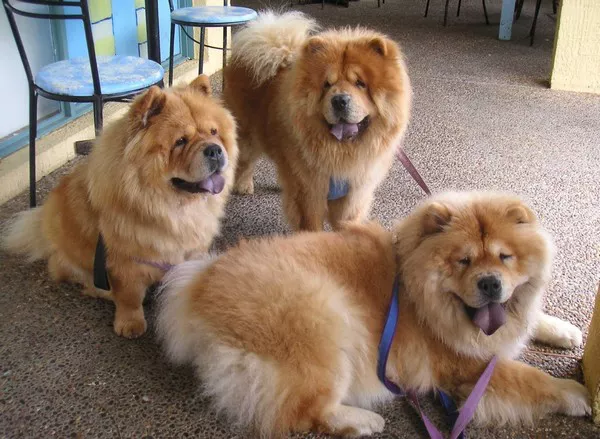Chow Chows, with their distinctive lion-like mane and regal appearance, have captured the hearts of many dog enthusiasts. However, beneath their charming exterior lies a breed that requires special attention and understanding due to potential dangers associated with their behavior and characteristics. In this article, we’ll delve into the reasons why Chow Chows are considered dangerous and what pet owners should keep in mind before bringing one into their homes.
1. Temperament and Aggression:
Chow Chows have a reputation for being fiercely loyal to their families, but their loyalty can sometimes manifest as overprotectiveness. This breed is known to be aloof and reserved around strangers, and without proper socialization, they can display aggressive behaviors.
Territorial Instincts: Chow Chows have a strong territorial instinct, making them wary of unfamiliar people or animals entering their space.
Guarding Tendencies: If not trained properly, Chow Chows might develop guarding tendencies, which can lead to aggressive responses when they perceive a threat to their family or territory.
2. Training Challenges:
Chow Chows are intelligent dogs, but their independent nature can pose challenges when it comes to training. Without consistent and patient training, undesirable behaviors can emerge.
Stubbornness: Due to their independent streak, Chow Chows might resist commands if they don’t see a reason to comply, making training sessions frustrating.
Positive Reinforcement: Positive reinforcement techniques, such as treats and praise, work best with Chow Chows, as they respond well to rewards.
3. Socialization Needs:
Proper socialization is crucial for all dog breeds, but it’s especially important for Chow Chows due to their predisposition towards aloofness.
Early Exposure: Exposing Chow Chows to a variety of people, animals, and environments from a young age helps reduce their tendency to be overly suspicious or aggressive.
Ongoing Effort: Socialization is an ongoing process that should continue throughout their lives to prevent behavioral issues from developing.
4. Grooming and Health Considerations:
The unique physical characteristics of Chow Chows come with specific grooming and health requirements.
Double Coat: Chow Chows have a double coat that requires regular brushing to prevent matting and tangling, which can be time-consuming.
Heat Sensitivity: Their thick coats make them prone to overheating, so they should be kept in a cool environment, especially during hot weather.
5. Liability and Legal Issues:
Owning a Chow Chow also comes with potential liability and legal concerns, as some regions may classify this breed as “dangerous” due to historical incidents.
Breed-Specific Legislation: Certain areas have breed-specific legislation in place, imposing restrictions or requirements on owning certain breeds, including Chow Chows.
Liability Awareness: Chow Chow owners should be aware of their dog’s behavior and take necessary precautions to prevent incidents that could lead to legal consequences.
Conclusion:
While Chow Chows can make wonderful companions for experienced and dedicated dog owners, it’s essential to recognize and address the potential dangers associated with this breed. Proper training, socialization, and responsible ownership practices are key to ensuring that a Chow Chow’s loyalty and unique qualities are channeled in a positive and safe manner.
FAQs about Chow Chows :
FAQ 1: Are Chow Chows really dangerous?
Chow Chows have certain traits and behaviors that can be considered dangerous if not properly managed. Their protective nature and tendency to be aloof around strangers can lead to aggressive responses if they feel threatened. However, with appropriate training, socialization, and responsible ownership, these risks can be minimized.
FAQ 2: Can Chow Chows be trained to be less aggressive?
Yes, Chow Chows can be trained to be less aggressive through consistent and positive reinforcement training methods. Early socialization and exposure to different people, animals, and situations are crucial in shaping their behavior. It’s important to work with experienced trainers who understand the breed’s characteristics.
FAQ 3: What should I know about Chow Chow grooming?
Chow Chows have a double coat that requires regular grooming to prevent matting and tangling. Brushing their fur a few times a week is essential to maintain their coat’s health. Additionally, their thick coats make them sensitive to heat, so owners should ensure they stay cool during warm weather.
FAQ 4: Are Chow Chows suitable for families with children?
Chow Chows can be challenging for families with young children, as their aloof nature might not align well with the energetic and unpredictable behavior of kids. However, with proper socialization and training from an early age, Chow Chows can coexist peacefully with children in a family environment.
FAQ 5: Are there legal concerns associated with owning a Chow Chow?
In some areas, Chow Chows may be subject to breed-specific legislation due to historical incidents or perceived dangerous behaviors. It’s important for potential owners to research and understand the laws and regulations in their region regarding owning this breed. Responsible ownership practices can help prevent legal issues.
FAQ 6: How can I ensure my Chow Chow is not dangerous?
To ensure your Chow Chow is not dangerous, focus on early socialization and training. Expose them to various people, animals, and environments to reduce their suspicion of strangers. Enroll them in obedience classes and use positive reinforcement methods to establish a strong bond and positive behavior patterns.
FAQ 7: Can Chow Chows live peacefully with other pets?
Chow Chows have a strong prey drive and can be dominant around other animals, especially if not properly socialized. Early introductions and supervised interactions with other pets are recommended. However, it’s important to note that individual temperaments vary, so some Chow Chows might be more accepting of other pets than others.
FAQ 8: What kind of owner is best suited for a Chow Chow?
Experienced dog owners who are patient, dedicated, and willing to invest time in training and socialization are best suited for Chow Chows. Their unique characteristics require an owner who understands the breed’s tendencies and is committed to providing the necessary guidance and care.


